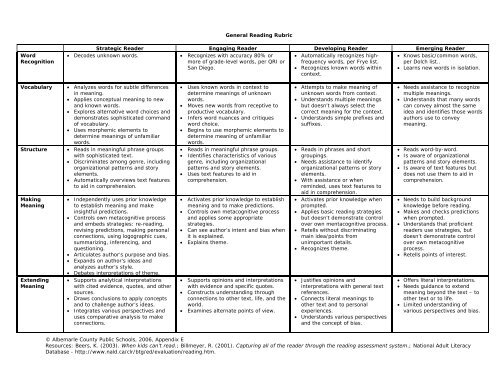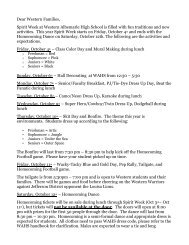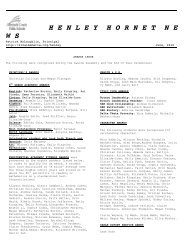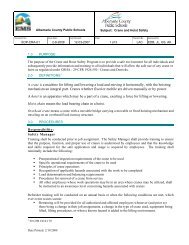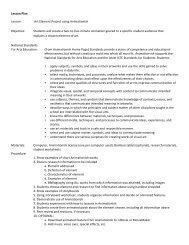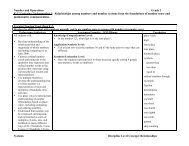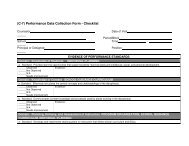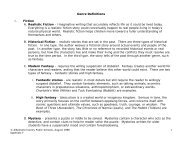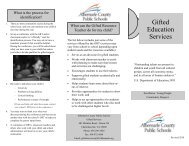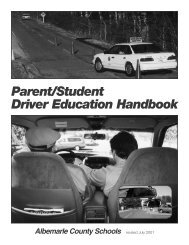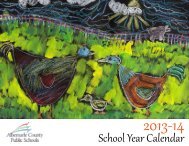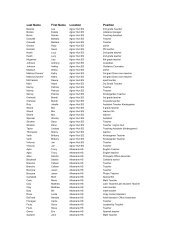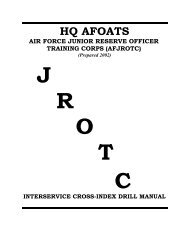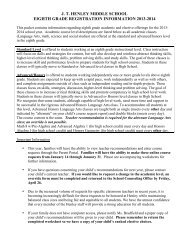Language Arts/English Curriculum Frameworks - Albemarle County ...
Language Arts/English Curriculum Frameworks - Albemarle County ...
Language Arts/English Curriculum Frameworks - Albemarle County ...
You also want an ePaper? Increase the reach of your titles
YUMPU automatically turns print PDFs into web optimized ePapers that Google loves.
General Reading Rubric<br />
Word<br />
Recognition<br />
Strategic Reader Engaging Reader Developing Reader Emerging Reader<br />
• Decodes unknown words.<br />
• Recognizes with accuracy 80% or • Automatically recognizes highfrequency<br />
• Knows basic/common words,<br />
more of grade-level words, per QRI or<br />
words, per Frye list. per Dolch list..<br />
San Diego.<br />
• Recognizes known words within • Learns new words in isolation.<br />
context.<br />
Vocabulary<br />
• Analyzes words for subtle differences<br />
in meaning.<br />
• Applies conceptual meaning to new<br />
and known words.<br />
• Explores alternative word choices and<br />
demonstrates sophisticated command<br />
of vocabulary.<br />
• Uses morphemic elements to<br />
determine meanings of unfamiliar<br />
words.<br />
• Reads in meaningful phrase groups<br />
with sophisticated text.<br />
• Discriminates among genre, including<br />
organizational patterns and story<br />
elements.<br />
• Automatically overviews text features<br />
to aid in comprehension.<br />
• Uses known words in context to<br />
determine meanings of unknown<br />
words.<br />
• Moves new words from receptive to<br />
productive vocabulary.<br />
• Infers word nuances and critiques<br />
word choice.<br />
• Begins to use morphemic elements to<br />
determine meaning of unfamiliar<br />
words.<br />
• Reads in meaningful phrase groups.<br />
• Identifies characteristics of various<br />
genre, including organizational<br />
patterns and story elements.<br />
• Uses text features to aid in<br />
comprehension.<br />
• Attempts to make meaning of<br />
unknown words from context.<br />
• Understands multiple meanings<br />
but doesn’t always select the<br />
correct meaning for the context.<br />
• Understands simple prefixes and<br />
suffixes.<br />
• Needs assistance to recognize<br />
multiple meanings.<br />
• Understands that many words<br />
can convey almost the same<br />
idea and identifies those words<br />
authors use to convey<br />
meaning.<br />
Structure<br />
• Reads in phrases and short<br />
groupings.<br />
• Needs assistance to identify<br />
organizational patterns or story<br />
elements.<br />
• With assistance or when<br />
reminded, uses text features to<br />
aid in comprehension.<br />
• Activates prior knowledge when<br />
prompted.<br />
• Applies basic reading strategies<br />
but doesn’t demonstrate control<br />
over own mentacognitive process.<br />
• Retells without discriminating<br />
main idea/points from<br />
unimportant details.<br />
• Recognizes theme.<br />
• Reads word-by-word.<br />
• Is aware of organizational<br />
patterns and story elements.<br />
• Is aware of text features but<br />
does not use them to aid in<br />
comprehension.<br />
Making<br />
Meaning<br />
• Independently uses prior knowledge<br />
to establish meaning and make<br />
insightful predictions.<br />
• Controls own metacognitive process<br />
and embeds strategies: re-reading,<br />
revising predictions, making personal<br />
connections, using logographic cues,<br />
summarizing, inferencing, and<br />
questioning.<br />
• Articulates author’s purpose and bias.<br />
• Expands on author’s ideas and<br />
analyzes author’s style.<br />
• Debates interpretations of theme.<br />
• Supports analytical interpretations<br />
with cited evidence, quotes, and other<br />
sources.<br />
• Draws conclusions to apply concepts<br />
and to challenge author’s ideas.<br />
• Integrates various perspectives and<br />
uses comparative analysis to make<br />
connections.<br />
• Activates prior knowledge to establish<br />
meaning and to make predictions.<br />
• Controls own metacognitive process<br />
and applies some appropriate<br />
strategies.<br />
• Can see author’s intent and bias when<br />
it is explained.<br />
• Explains theme.<br />
• Needs to build background<br />
knowledge before reading.<br />
• Makes and checks predictions<br />
when prompted.<br />
• Understands that proficient<br />
readers use strategies, but<br />
doesn’t demonstrate control<br />
over own metacognitive<br />
process.<br />
• Retells points of interest.<br />
Extending<br />
Meaning<br />
• Supports opinions and interpretations<br />
with evidence and specific quotes.<br />
• Constructs understanding through<br />
connections to other text, life, and the<br />
world.<br />
• Examines alternate points of view.<br />
• Justifies opinions and<br />
interpretations with general text<br />
references.<br />
• Connects literal meanings to<br />
other text and to personal<br />
experiences.<br />
• Understands various perspectives<br />
and the concept of bias.<br />
• Offers literal interpretations.<br />
• Needs guidance to extend<br />
meaning beyond the text – to<br />
other text or to life.<br />
• Limited understanding of<br />
various perspectives and bias.<br />
© <strong>Albemarle</strong> <strong>County</strong> Public Schools, 2006, Appendix E<br />
Resources: Beers, K. (2003). When kids can’t read.; Billmeyer, R. (2001). Capturing all of the reader through the reading assessment system.; National Adult Literacy<br />
Database - http://www.nald.ca/clr/btg/ed/evaluation/reading.htm.


